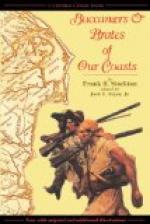The occasional repetition of such acts as this, and the exhibition of dangling pirates, hung up like scarecrows at the entrance of the harbors, dampened the ardor of the freebooters a good deal, and for some years they kept away from the harbor of Charles Town, which had once been to them such a friendly port.
Chapter XXII
The Great Blackbeard comes upon the Stage
So long as the people of the Carolinas were prosperous and able to capture and execute pirates who interfered with their trade the Atlantic sea-robbers kept away from their ports, but this prosperity did not last. Indian wars broke out, and in the course of time the colonies became very much weakened and impoverished, and then it was that the harbor of Charles Town began to be again interesting to the pirates.
About this time one of the most famous of sea-robbers was harassing the Atlantic coast of North America, and from New England to the West Indies, he was known as the great pirate Blackbeard. This man, whose real name was Thatch, was a most terrible fellow in appearance as well as action. He wore a long, heavy, black beard, which it was his fancy to separate into tails, each one tied with a colored ribbon, and often tucked behind his ears. Some of the writers of that day declared that the sight of this beard would create more terror in any port of the American seaboard than would the sudden appearance of a fiery comet. Across his brawny breast he carried a sort of a sling in which hung not less than three pairs of pistols in leathern holsters, and these, in addition to his cutlass and a knife or two in his belt, made him a most formidable-looking fellow.
Some of the fanciful recreations of Blackbeard show him to have been a person of consistent purpose. Even in his hours of rest when he was not fighting or robbing, his savage soul demanded some interesting excitement. Once he was seated at table with his mate and two or three sailors, and when the meal was over he took up a pair of pistols, and cocking them put them under the table. This peculiar action caused one of the sailors to remember very suddenly that he had something to do on deck, and he immediately disappeared. But the others looked at their captain in astonishment, wondering what he would do next. They soon found out; for crossing the pistols, still under the table, he fired them. One ball hit the mate in the leg, but the other struck no one. When asked what he meant by this strange action, he replied that if he did not shoot one of his men now and then they would forget what sort of a person he was.




